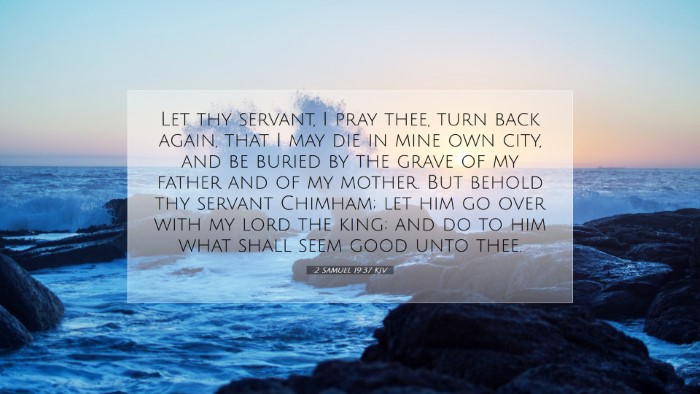Old Testament
Genesis Exodus Leviticus Numbers Deuteronomy Joshua Judges Ruth 1 Samuel 2 Samuel 1 Kings 2 Kings 1 Chronicles 2 Chronicles Ezra Nehemiah Esther Job Psalms Proverbs Ecclesiastes Song of Solomon Isaiah Jeremiah Lamentations Ezekiel Daniel Hosea Joel Amos Obadiah Jonah Micah Nahum Habakkuk Zephaniah Haggai Zechariah MalachiVerse
2 Samuel 19:1 2 Samuel 19:2 2 Samuel 19:3 2 Samuel 19:4 2 Samuel 19:5 2 Samuel 19:6 2 Samuel 19:7 2 Samuel 19:8 2 Samuel 19:9 2 Samuel 19:10 2 Samuel 19:11 2 Samuel 19:12 2 Samuel 19:13 2 Samuel 19:14 2 Samuel 19:15 2 Samuel 19:16 2 Samuel 19:17 2 Samuel 19:18 2 Samuel 19:19 2 Samuel 19:20 2 Samuel 19:21 2 Samuel 19:22 2 Samuel 19:23 2 Samuel 19:24 2 Samuel 19:25 2 Samuel 19:26 2 Samuel 19:27 2 Samuel 19:28 2 Samuel 19:29 2 Samuel 19:30 2 Samuel 19:31 2 Samuel 19:32 2 Samuel 19:33 2 Samuel 19:34 2 Samuel 19:35 2 Samuel 19:36 2 Samuel 19:37 2 Samuel 19:38 2 Samuel 19:39 2 Samuel 19:40 2 Samuel 19:41 2 Samuel 19:42 2 Samuel 19:43

